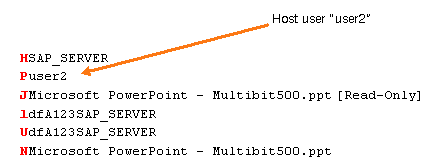Example of a RFC 1179 control file
A control file as per RFC 1179 is usually created by print systems under Unix. For the Host Integration Service, it does not matter whether the control file is sent from the LPR (host print system) to the LPD (Host Integration Service) before or after the print data. The control file could contain the following information:
Legend:
H = Host name (= LPR)
P = User name on the host system (see also Name translation)
J = Document name
l = Data file for which no filter is to be used
U = Data file name
N = Document name
Alternative user name transmission
As an alternative to the control file, the user name from the host system can also be embedded as follows:
- in the print job’s banner page
- in the print job name
- in the printer queue name
You can set the syntax for the embedding yourself. Simply make sure that the Host Integration Service can retrieve the user name from the received data. To do so, you have to define the following registry keys for the Host Integration Service by hand:
hkey_local_machine\software\thinprint\tplpd\jobinfo [reg_dword)]
hkey_local_machine\software\thinprint\tplpd\formatstringre [reg_sz]
As the content of JobInfo, enter the source of the user name (control file, banner page, print job name or queue name; see JobInfo).
As the content of FormatStringRE, enter a character string in form of a Regular Expression. This specifies where the user name is found in the received data (Relevant entries in Windows Registry).
Examples for user names embedded in print job names:
| Print job name | FormatStringRE | Meaning |
| user2.text.ps = print file text.ps from user2 | ([^.]*).* | All characters up to the first period (.) belong to the sought user name. The rest is ignored. (default value) |
| 1234user2.text.ps = print file text.ps with job ID 1234 from user 2 | [0-9]*([^.]*).* | All digits at the start belong to a job ID. The following characters give the sought user name – up to the first period (.). The rest is ignored. |
| text.ps:user2 = print file text.ps from user2 | .*:(.*) | All characters up to the first colon (:) are ignored. The following characters give the sought user name. |
